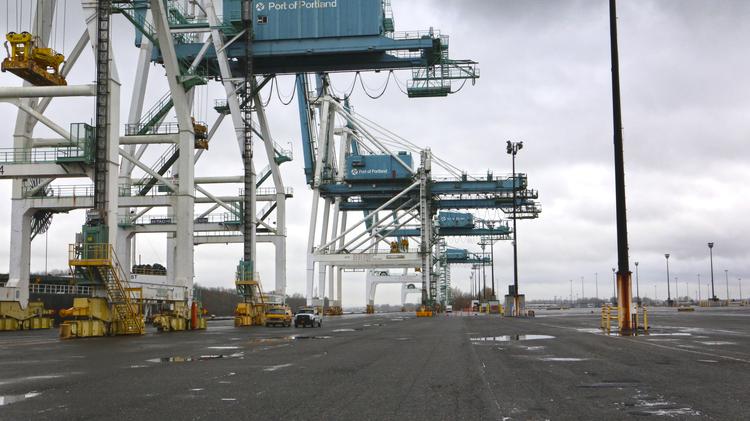forum
library
tutorial
contact

NLRB Rules Longshore
Union Broke Labor Laws
by Conrad Wilson
Jefferson Public Radio, December 22, 2015
|
the film forum library tutorial contact |

|
NLRB Rules Longshore
by Conrad Wilson
|
 Since September, the National Labor Relations Board has ruled -- twice -- that the International Longshore and Warehouse Union violated federal labor laws at the Port of Portland.
Since September, the National Labor Relations Board has ruled -- twice -- that the International Longshore and Warehouse Union violated federal labor laws at the Port of Portland.
The rulings are significant because the union could end up paying millions of dollars in damages.
The ILWU has asked the U.S. Court of Appeals for the District of Columbia to review the board's decisions.
The NLRB found the union wrongfully engaged in slowdowns and work stoppages at the Port of Portland in 2012 and 2013.
"They're basically being ordered to cease and desist the continued actions of violating those laws," said Elvis Ganda, president and CEO of ICTSI Oregon.
Ganda's company runs the Port of Portland's Terminal 6. It's Oregon's only international container terminal, which has been at the center of a several year long labor dispute. Earlier this year, the port's main container carriers -- Hanjin and Hapag-Lloyd -- left because of the labor issues between the union and ICTSI Oregon.
"I'd rather not be in this situation where we have a ruling that we have to work through," Ganda said. "We'd rather have the terminal running without a labor problem. But I think the courts have listened to the evidence, heard the testimony, they've identified the issues and ruled properly."
The National Labor Relations Board was set up in the 1930s as a way to resolve disputes between unions and management.
The ILWU declined an interview request, and referred to an earlier statement that said it was "disappointed" by the labor board's decision.
"We expect a better hearing of our arguments and certainly more consideration of the law when we get before the appeals court," said then ILWU Coast Committeeman Leal Sundet in a statement from Sept. 30, 2015. "Contrary to the propaganda assertions made by ICTSI, the NLRB decision does not speak to any activity at Terminal 6 other than a short period of time during 2012."
Henry Drummonds, a professor of labor law at Lewis and Clark Law School in Portland, said the ILWU could be vulnerable in a damages lawsuit.
"The (NRLB's) decision is a set back for the union," he said. "The law provides in a case like this, there is a right of injured parties that can show they've been damaged to go to court and seek damages in the federal district court."
ICTSI Oregon has done just that. In October, the company estimated damages to be $30 million; a figure the company said increases daily.
Bill Wyatt, the executive director of the Port of Portland, said the port is part of a lawsuit against the union.
"The danger for the ILWU is that these damages are going to be, they're going to be enormous, the financial damages," he said. "The danger for the rest of us is that with this mountain of litigation no body wants to come here."
Without a resolution to the labor issues, Wyatt said, it's difficult to attract new container service to Portland.
"Frankly, I'm hoping that the mounting financial and legal challenges will cause cooler heads to prevail," he said.
Since the majority of container service left Portland earlier this year, the union has had significantly less work, Wyatt said.
"The number of hours that have been taken out of Longshoring in Portland is huge," he said. "About 30 percent in the total Portland harbor. And there's really no way to replace that. We're hoping that as individual members begin to experience that they start to think about ways that we can resolve this."
Union members draw from a fund to help make ends meet when they don't have enough paying work. Historically, the pay guarantees were to make sure there was enough labor to unload ships when they called a port.
From the first quarter of 2015 to the third quarter, those payments ballooned more than 4,000 percent, according to figures from the Pacific Maritime Association.
Ganda, ICTSI Oregon's CEO, said that means union members are working less.
"What we want is to get the terminal back on track, bring business back to Portland and grow the business here, create jobs, not lose jobs," Ganda said. "We're hoping that the ILWU will reconsider their position and their tactics and work with us to bring the business back now instead of letting this continue for a longer period of time."
Even still, it could be months, even a year, before there's any significant change in Portland's container service.
Related Sites:
Shipping Report by Port of Porland, 2011 to 2015
learn more on topics covered in the film
see the video
read the script
learn the songs
discussion forum
